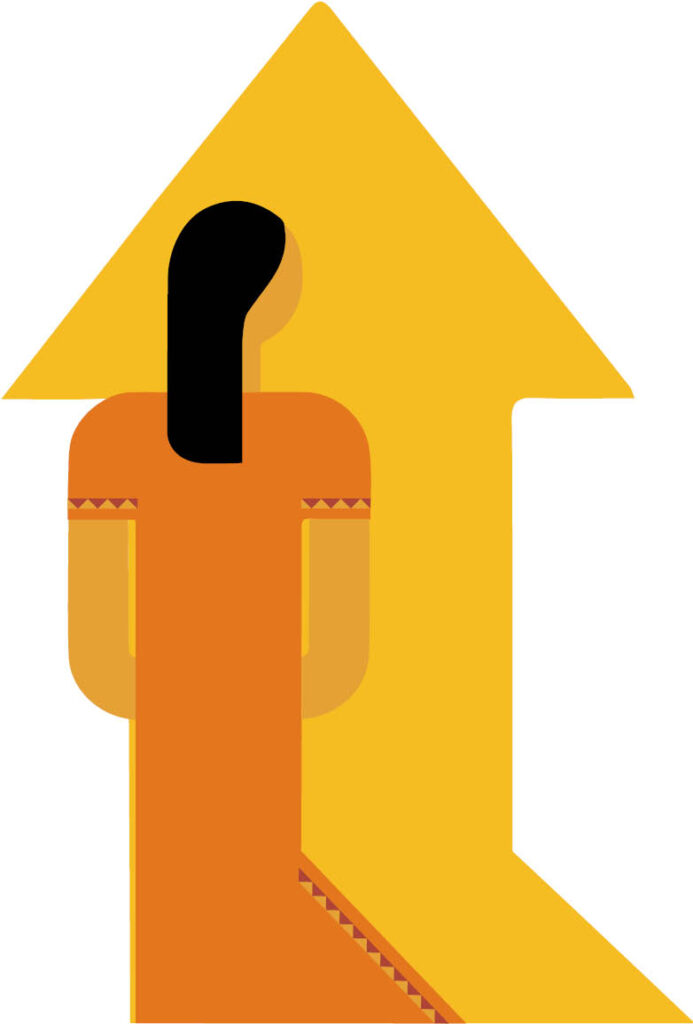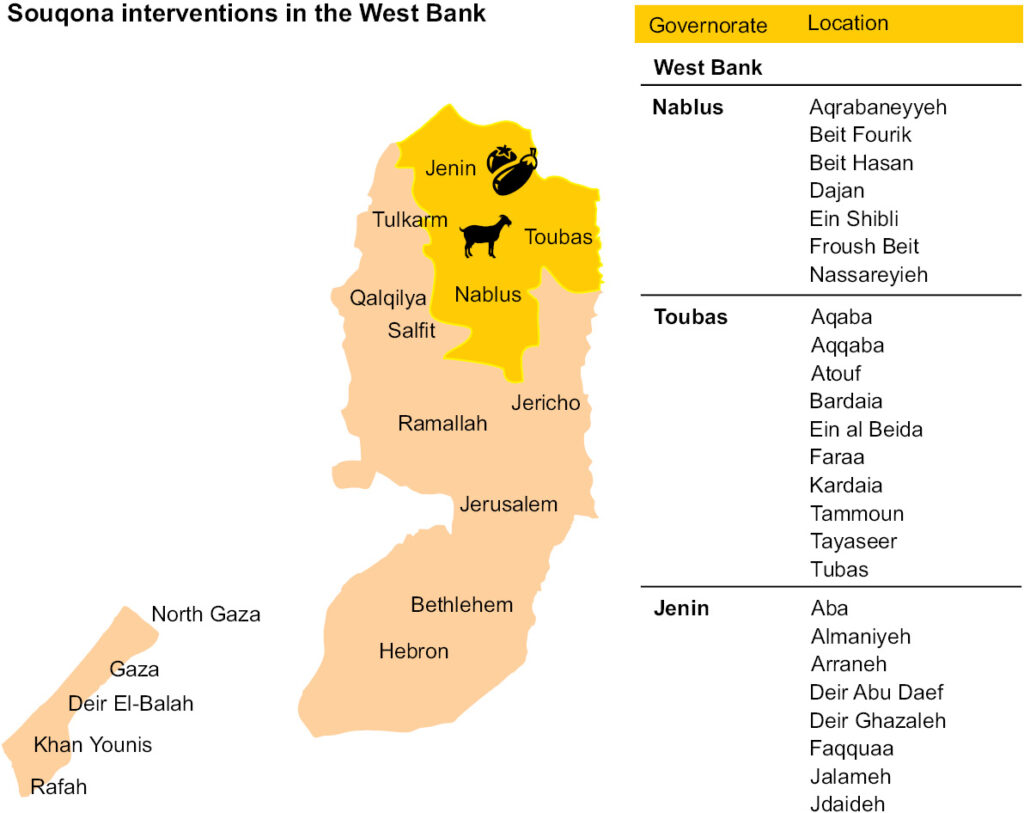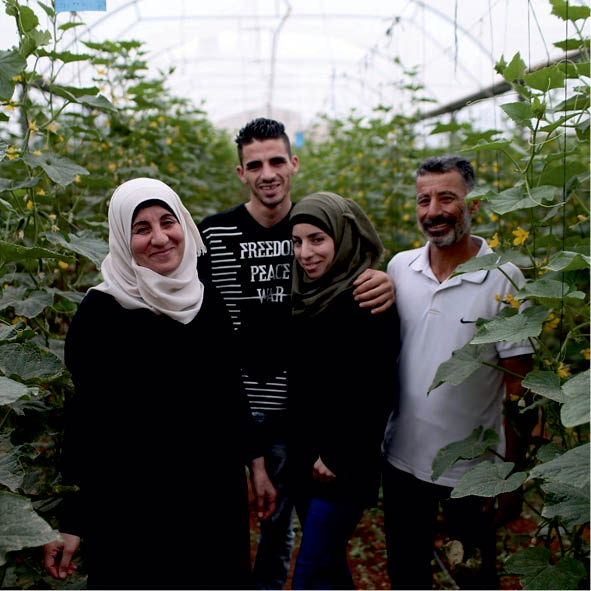Farming is part of Palestinian cultural identity, and the agricultural sector employs more than one in ten men and one in five women in Palestine. The sector is characterized by structural inefficiencies, an important aspect of which is the small size of farms. Around 85 percent of agriculture in Palestine is semi-subsistent, family-based farming with relatively little production – which means that 15 percent are commercial farms that consist of relatively large possessions. To reinvigorate agriculture in the Palestinian state-building project, the Palestinian National Authority (PNA) named it a priority. The Australian government, which supports the third phase of the Australia Middle East NGO Cooperation Agreement (AMENCA 3) program in the Palestinian Territories, supports the PNA’s efforts to make farming a more significant contributor to economic development and a means of strengthening community fabric.
As part of AMENCA 3, CARE launched the Souqona (“our market”) project in April 2016, a five-year project that aims to increase the income, agency, and market opportunity of female and male Palestinian farmers engaged in the vegetable and sheep and goat dairy value chains. It operates in 23 locations in three northern governorates of the West Bank (Nablus, Jenin, and Tubas). The project works to improve the market system and develop two main value chains* – namely the sheep and goat value chain and the vegetable value chain – by working with a wide range of stakeholders to address the production, marketing, and input constraints in the selected value chains. The project develops business models and case studies based on scientific research and findings.
Souqona has undertaken the following five primary implementation activities.

1 – Safer products: This focuses on safer pesticide application and reduced use of pesticides. The primary aim is to ensure that farmers apply the best agricultural practices. This is a response to significant concerns that bad practice and the use of unregistered or uncontrolled pesticides have not only led to high levels of chemical residues but also resulted in acute and chronic impacts on the health of the farmers themselves. A certification scheme was developed in cooperation with the Palestinian Standards Institute that should improve access to domestic markets and deliver a price/demand premium as well as convey a significant health benefit.
2 – Dairy model: Souqona works with cooperatives of women and men farmers to buy, chill, and market fresh goat and sheep milk to private-sector buyers. Currently, smallholder farmers cannot store milk and therefore are obliged to process and sell soft white cheeses, thus rendering them price takers with little transactional power. Collecting bulk quantities of milk, and chilling and ensuring its quality, is therefore a way to deliver a better price premium and lift the workload on women to process the cheese in-house. Private-sector firms use modern techniques and machinery to produce various dairy products with controlled hygiene and quality systems.
3 – Animal feed: Small ruminant livestock in the Palestinian territories are generally poorly fed, have low fecundity, and are prone to disease, low birth weights, and high mortality of both mothers and offspring. By significantly improving nutrition through the use of comparatively cheap feed supplements, milk supplements, and silage, their productivity and survival rates have greatly improved.

4 – Minor infrastructure (farm roads and irrigation networks): Souqona has rehabilitated local farm roads that can improve Palestinian farmers’ access to their land and thereby bolster their investment in their land. The project also works to improve access to reliable water sources through support of the irrigation network infrastructure.
5 – Social inclusion: Economic empowerment entails equal access to and control over economic resources, assets, and opportunities, as well as long-term changes in social norms and economic structures that equally benefit women, youth, and men. In order to address these issues, Souqona mainstreamed the inclusion of women and youth in the project activities through facilitating access to technical and business knowledge for women and youth (holding demonstrations led by women, supporting exchange visits, etc.). Souqona has worked to improve the economic inclusion of youth and women through entrepreneurship training, community initiatives, and other training and demonstration sessions. Young women leaders were chosen as facilitators to promote the economic opportunities supported by Souqona and act as advocates for women’s needs.
“With AMENCA 3 support, we can now sell milk to the local Milk Collection Hub to earn our living, and we no longer need to worry about producing white cheese, which is a very tiring and time-consuming process.”
Wesam Mletat, a Souqona beneficiary

Since the beginning of the project, 21,790 farmers (including 6,949 women and 8,344 young people) have reported that their income has increased as a result of Souqona interventions, almost US$14 million from additional agricultural production and US$43 million from sales have been generated. Farming communities are using innovative agricultural practices and working profitably with private-sector entities across all value chains. Moreover, US$16 million of private-sector investments have been leveraged. Women and youth have more opportunities to gain income, and their contributions and voices are better recognized within their communities. The program’s contributions to agricultural productivity and value chains have also affected a larger number of indirect beneficiaries in rural communities as well as the broader agricultural economy in the Palestinian territories.
*A value chain constitutes the various stages a product must pass through to reach the consumer, from inputs and land preparation to cultivation, processing, storage, and retailers.


